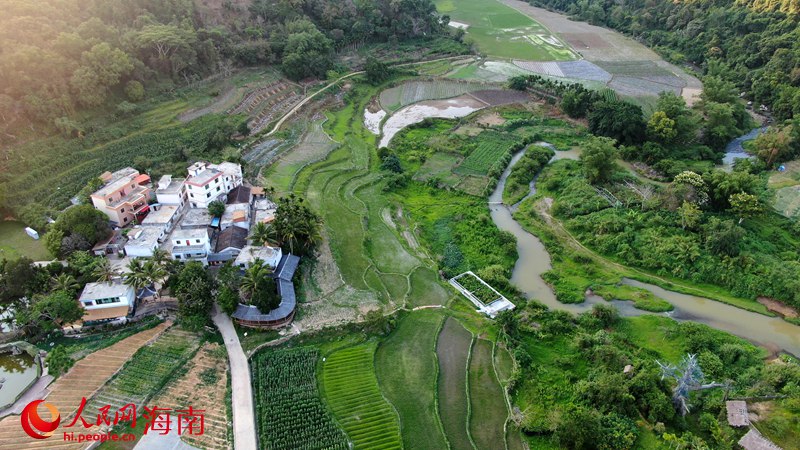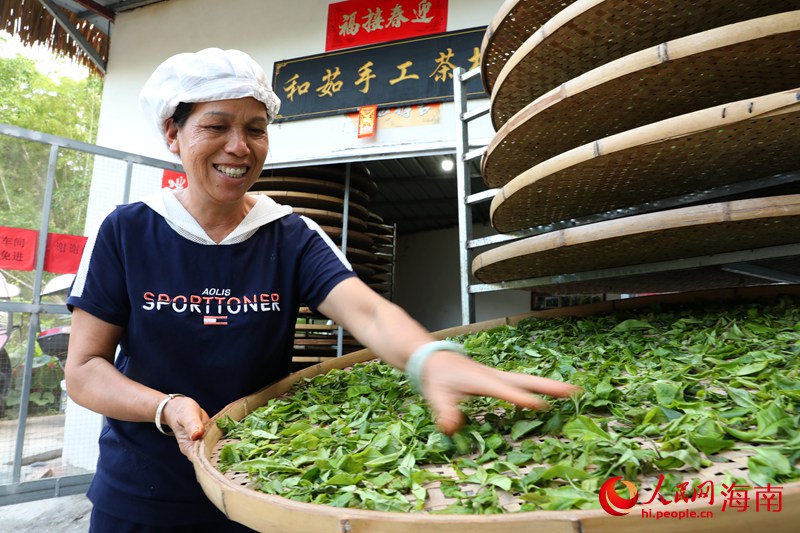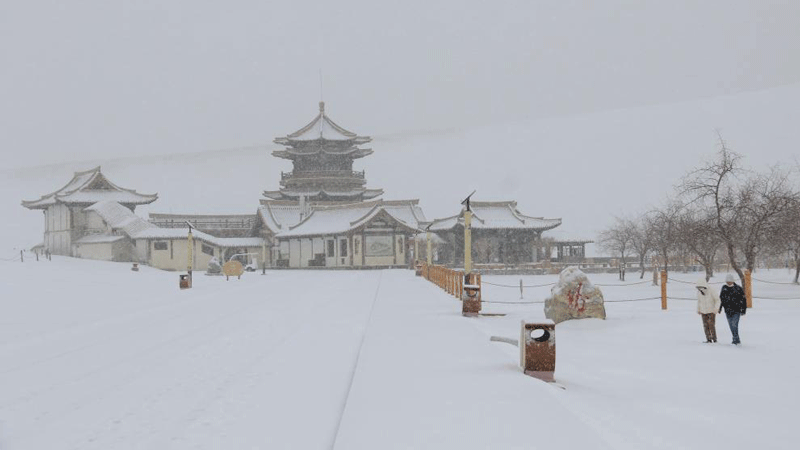Village in S China’s Hainan marches toward prosperity by developing industries, tapping into local culture
Maona village in south China’s Hainan Province has embarked on a development path characterized by a sound ecology, thriving industries, and wealthy people in recent years, by developing industries with local features and boosting the protection and inheritance of traditional ethnic culture.

The aerial photo shows Maona village in Wuzhishan city, south China’ s Hainan Province. (People’s Daily Online/Fu Wuping)
Located at the foot of Wuzhishan Mountain, Maona village of Shuiman township is a Li ethnic village in Wuzhishan city, Hainan. “Now, industries are flourishing, young people are returning to start businesses, and villagers are embracing better lives,” said Gao Li, the village’s first secretary.
When Gao took office in the village in May last year, he began to think about ways to develop industries that could serve the interests of all villagers. After carrying out an in-depth survey, he decided to develop the tea industry according to local conditions.
Shuiman township is a tea production area in Hainan located at a high altitude and low latitude. In the past, some residents in Maona village planted tea trees, but the yield was unsatisfactory due to careless management.
To help villagers develop the industry, Gao explained the supportive policies launched by Wuzhishan city and Hainan Province. He noted that villagers could obtain tea seedlings for free, apply for loans with discounted interest rates and subsidies, and attend regular training courses after joining cooperatives.

Villager Wang Juru selects tea leaves in Maona village in Wuzhishan city, south China’ s Hainan Province. (People’s Daily Online/Fu Wuping)
Wang Juru, a resident of the village, is skilled at making hand-crafted black tea. Gao advised Wang and her husband to learn tea-making techniques at a tea plant featuring standardized production to further improve the quality of their tea. “Now, we’re living better lives by planting tea trees and making tea,” Wang said.
Wang and her husband run a tea house and a tea cooperative. Wang’s black tea is a hit in the market. “This year, all my tea leaves were sold out,” she said with a smile.
So far, the planting area of tea in Maona village has reached 572 mu (about 38.1 hectares). Thanks to the development of the tea industry, the per capita disposable income of villagers has exceeded 15,000 yuan (about $2,080).
“While developing the tea industry, we remain committed to putting the environment first and pursuing green development,” said Li Dafei, the sci-tech expert sent to Shuiman township.
Li said the practice of spraying pesticides arbitrarily had to be stopped in order to produce high-quality tea. Li introduced pest traps to Maona village, which resemble “small lanterns” and are tied to tea trees, to prevent and control pests in an environmentally-friendly manner.

The photo shows a view of Maona village in Wuzhishan city, south China’ s Hainan Province. (People’s Daily Online/Fu Wuping)
“We are also promoting ecological planting. We have stopped cutting down other trees to plant tea trees, and adopt intercropping techniques to reduce the occurrence of plant diseases and pests,” Li added.
At the same time, Maona village has also inherited traditional culture to help boost rural revitalization.
Zhuo Shuyan, a young woman from the Li ethnic group who grew up in Shuiman township, has devoted herself to inheriting traditional culture to boost rural revitalization since 2017, when she returned to Wuzhishan city and established a company.
“The Li ethnic culture has a long history. Li brocade, Li pottery and firewood-cutting dance are national intangible cultural heritages,” said Zhuo.
Zhuo’s company has a team whose main responsibility is promoting the long-table banquet of the Li ethnic group. Seven of the 12 team members are from Maona village.
“I talked with Gao and planned to establish an exhibition hall focusing on the Li ethnic culture near Maona village to let more people understand our ethnic culture,” Zhuo said.
On July 8, a test to appraise the vocational skills of trainees who attended a 13-day training course on Li brocade techniques was held in the village. “We want to boost the interest of villagers, especially young people, in learning the traditional craft by holding the training course, so as to help carry on traditional culture and increase villagers’ incomes,” said Gao.
In June this year, Maona village set up a firewood-cutting dance team to give performances for tourists, thus integrating Li ethnic culture with rural tourism. The team made its public debut during the National Day holiday.
“Now, we give performances every week. We have 27 dancers and are getting an increasing number of orders,” said Wang Zhengzhu, head of the team and a resident of Maona village.
Photos
Related Stories
- Bonsai grows into big industry in Yifeng city, E China's Jiangxi
- Retirees contribute to Guizhou rural vitalization
- Photos of rural families record changes in SW China’s Guizhou’s countryside
- Little leaves of tea become big business in county of China's Yunnan
- Man in China's Hebei makes name for himself by growing pears
- Batik workshops help increase incomes of Miao women in SW China's Guizhou
- Grassroots official in China's Sichuan brings rosy prospects to villagers through rose industry
- Internet thinking gives a boost to rice business in northeast China
- China makes great strides in rural vitalization over past 5 years
- Young Chinese help drive rural vitalization with entrepreneurship
Copyright © 2022 People's Daily Online. All Rights Reserved.









